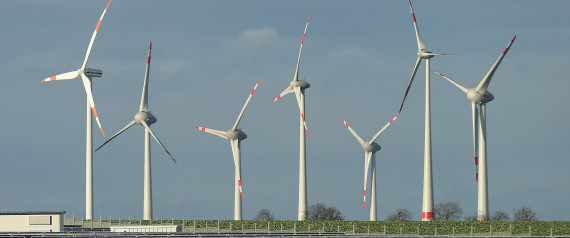Obama Tells Government To Ramp Up Its Renewable Energy Use
This post was updated at 1:30 p.m. ET
President Obama says the U.S. government "must lead by example" when it comes to safeguarding the environment, so he's ordering federal agencies to use more clean energy.
Under a presidential memorandum out Thursday, each agency would have until 2020 to get 20 percent of its electricity from renewable supplies.
http://www.npr.org/blogs/thetwo-way/2013/12/05/248992522/u-s-government-must-use-more-renewable-energy-obama-says
President Obama says the U.S. government "must lead by example" when it comes to safeguarding the environment, so he's ordering federal agencies to use more clean energy.
Under a presidential memorandum out Thursday, each agency would have until 2020 to get 20 percent of its electricity from renewable supplies.
http://www.npr.org/blogs/thetwo-way/2013/12/05/248992522/u-s-government-must-use-more-renewable-energy-obama-says
Nuclear industry questions exclusion from Obama clean power order
Nuclear industry questions exclusion from Obama clean power order - Read this Platts electric power news article here
The Answer to Climate Change Is Renewable Energy, Not Nuclear Power
Posted: 11/25/2013 9:44 am
When climate scientists and some energy policy analysts take a "tough-minded" look at the numbers, many come to the conclusion that the only technology now available to replace fossil fuels is nuclear power. Eduardo Porter of the New York Times made that argument last week when he wrote:
This means that even though we know how to generate electricity this way, and we have many decades of experience doing it, in the U.S. these plants will never be built in sufficient quantity to reduce global warming. In other parts of the world, we might pay attention to the lessons we should be learning in Iran. There is a thin line between the technology of nuclear power generation and the technology of nuclear bomb development. While it's too late to put the nuclear genie back in the bottle, let's stop pretending that human political systems or organizational processes can manage the risks of this technology.
There are other issues associated with current nuclear technologies that render them problematic as well. The toxicity of its fuel and waste, for example, should not be ignored. Catastrophic accidents may be rare, but when they occur, their impact is intense and long-lasting. While a well-managed plant poses little real danger, it is difficult to judge the danger posed by a poorly managed one. One also cannot dismiss the possibility of sabotage. Terrorists taking over a plant and threatening to allow an accident to occur could hold a city hostage.
Click here to read more: http://www.huffingtonpost.com/steven-cohen/the-answer-to-climate-cha_b_4337435.html
...nuclear power remains the cheapest and most readily scalable of the alternative energy sources.As I indicated this past April, I disagree. There are a number of reasons that nuclear power is a bad solution to the climate crisis. The first is that the technology is really not available. Nuclear power plants are capital-intensive, technologically complex to manage, and difficult, if not impossible, to site. These are not minor issues. Investors would rather put their money elsewhere and communities intensely resist siting a plant in their backyard.
This means that even though we know how to generate electricity this way, and we have many decades of experience doing it, in the U.S. these plants will never be built in sufficient quantity to reduce global warming. In other parts of the world, we might pay attention to the lessons we should be learning in Iran. There is a thin line between the technology of nuclear power generation and the technology of nuclear bomb development. While it's too late to put the nuclear genie back in the bottle, let's stop pretending that human political systems or organizational processes can manage the risks of this technology.
There are other issues associated with current nuclear technologies that render them problematic as well. The toxicity of its fuel and waste, for example, should not be ignored. Catastrophic accidents may be rare, but when they occur, their impact is intense and long-lasting. While a well-managed plant poses little real danger, it is difficult to judge the danger posed by a poorly managed one. One also cannot dismiss the possibility of sabotage. Terrorists taking over a plant and threatening to allow an accident to occur could hold a city hostage.
Click here to read more: http://www.huffingtonpost.com/steven-cohen/the-answer-to-climate-cha_b_4337435.html




